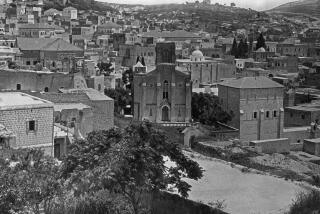Pair Says U.S. Government Left Them Stranded in Poland During WWII
You think you have a beef against the United States government?
Forget it.
You’re in clover compared to Charles Straczynski, 62, of Bonita. He has a beef against the United States government.
The tale starts when Straczynski, his sister and their mother went to Poland in the summer of 1939 on vacation.
War clouds were gathering, but the family, then rooted in Paterson, N.J., wanted to visit the ancestral home in Bogdanova, a village 75 kilometers from Minsk.
On Sept. 1, the family was at the train depot waiting to leave Poland. That was the day Hitler’s troops and dive-bombers struck Poland and began World War II.
Stranded in the dirt-poor village, the family stole food and foraged berries and mushrooms from the forest to survive. First came a brutal occupation by the Nazis, then an equally brutal occupation by the Russians.
Charles took boots off dead soldiers to sell on the black market. He watched Nazis round up Jews for the gas chambers. He watched his sister, who had polio, suffer horribly without medical attention.
In 1946, the family huddled together in a cattle car and traveled to Moscow, whence passage back to America was arranged.
Charles finished school, did a tour in the Air Force and worked in the plastics industry. He and his wife, Evelyn, moved to Chula Vista. He started a manufacturing firm to make plastic orthodontic devices.
His mother died in 1982. Several years later, his sister made a startling discovery when she was going through her mother’s papers: correspondence between a family friend in Paterson and the U.S. Embassy in Moscow.
The friend had written repeatedly for help in getting the family out of Poland. An embassy bureaucrat wrote back and said that travel costs would be $1,000.
The friend sent $175. The bureaucrat wrote back and said that wasn’t enough. It took until 1946 for the friend to gather up the rest of the money.
Straczynski was devastated: “I always wondered why we were stuck there, why nobody helped us. We were Americans!”
He had always assumed that no one had known of the family’s whereabouts. The letters showed otherwise.
“The government knew where we were the entire seven years,” Straczynski says.
A few months ago, Straczynski made a request under the federal Freedom of Information Act to see what more the government knew about his family’s case.
Recently he got a meager envelope from the National Archives with only a letter from a New Jersey congressman dated in late 1939 asking Secretary of State Cordell Hull to help get the family home.
There was no second letter and no response from Hull.
As Straczynski sees it, the conclusion is clear: A family from Paterson, N.J., was too unimportant and too poor to merit help from its own government, even though the government was elsewhere engaged in large-scale evacuation efforts.
“We lost seven years of our lives because of $1,000,” he says. “It hurts.”
Jail and Other Business
Things of note.
* A county custodian who lost his job for selling a pack of cigarettes for $10 to an inmate at the (no-smoking) County Jail was reinstated Friday by the Civil Service Commission.
Moral: Just because there’s smoke, there doesn’t have to be a firing.
* Seen southbound on Interstate 5, headed toward the Del Mar Racetrack (driven by a guy in a cowboy hat):
An ancient white Cadillac convertible, tail fins and all.
With the license plate: MY QE2.
(Do I have to tell you that’s a reference to the liner Queen Elizabeth II? If not, forget I mentioned it.)
* San Diego Republicans are getting fund-raising letters and bumper stickers from Marilyn Quayle.
* Get your impressions and gross noises ready.
Talent scouts for ABC’s “America’s Funniest People” are coming: Friday at Plaza Camino Real in Carlsbad, Saturday at Parkway Plaza in El Cajon and Sunday at Belmont Park in San Diego.
* San Diego restaurant owner (El Tecolote Mexican restaurant in Mission Valley) and actor Leon Singer has signed to do a “Columbo” this fall for Universal.
He played the cook, Bolivar, in TV’s “Lonesome Dove.”
* Tijuana cops and firefighters hand out free condoms to the poor (and sexually active).
* Bumper sticker seen in Mira Mesa: “When Hell Freezes Over, I’ll Ski There, Too.”
More to Read
Sign up for Essential California
The most important California stories and recommendations in your inbox every morning.
You may occasionally receive promotional content from the Los Angeles Times.










